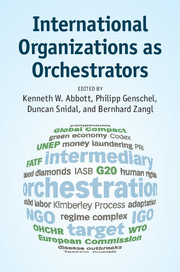1 - Orchestration
global governance through intermediaries
Published online by Cambridge University Press: 05 April 2015
Summary
Abstract
This chapter develops a conceptual framework for analyzing orchestration, a mode of governance widely used by international organizations (IGOs) and other governance actors, but rarely identified or analyzed. IGOs engage in orchestration when they enlist intermediary actors on a voluntary basis, by providing them with ideational and material support, to address target actors in pursuit of IGO governance goals. Orchestration is thus both indirect (because the IGO acts through intermediaries) and soft (because the IGO lacks control over intermediaries). These features distinguish orchestration from traditional hierarchical governance, which addresses targets directly through hard instruments; from governance through collaboration with targets, which is direct but soft; and from delegation, which is indirect (because the IGO works through an agent) but hard (because the IGO can control the agent). The chapter elaborates the concept of orchestration, identifies common patterns and techniques, and advances hypotheses regarding the conditions under which governance actors in general and IGOs in particular can be expected to rely on orchestration.
Introduction: orchestration and international organizations
IGOs have ambitious governance goals but moderate governance capacity. IGOs are charged with, among many other tasks, containing the use of violence, facilitating free trade, advancing economic development, fighting organized crime, promoting human rights, improving labor standards, defending biodiversity and providing relief after natural disasters and armed conflicts. Yet IGOs’ ability to govern state and non-state behavior in pursuit of these goals is constrained by restrictive treaty mandates, close member state oversight and limited financial and administrative resources. In brief, IGOs often lack the capabilities to perform the roles they have been nominally allocated.
- Type
- Chapter
- Information
- International Organizations as Orchestrators , pp. 3 - 36Publisher: Cambridge University PressPrint publication year: 2015
- 124
- Cited by

